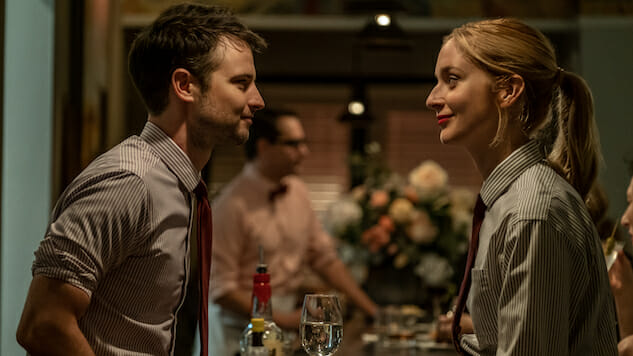Sweetbitter Season Two Continues to Explore Restaurant Life with Slight but Stylish Vignettes
The Starz summer series is an easy binge.
Photo Courtesy of Starz
The Starz series Sweetbitter, based on Stephanie Danler’s novel, was much maligned in its short first season. Some felt it was a standard coming-of-age in New York story that didn’t do enough to shake up the genre, or that it didn’t do the beloved book justice, or that it was too focused on the privilege of the fine dinning culture in which it resides. But, rather thankfully for those of us who did enjoy its inaugural episodes, it’s back. Sweetbitter is a slight show in many ways, the kind of perfect summer watch that makes you quasi-nostalgic for your own coming-of-age experiences: young love in a big city, being the new kid at a job, and being open to the experiences that will come to shape your adulthood. In that regard, Sweetbitter succeeds greatly, quietly exploring restaurant life—and the life of a young person making big moves and big mistakes—with the flitting charm and randomness that so closely defines these kinds of encounters.
In Season Two, Tess (Ella Purnell) is no longer just the wide-eyed ingenue she started off as, but she is still naive and full of wonder at things her jaded co-workers find to be pedestrian. The restaurant’s manager, Howard (an excellent Paul Sparks, but when is he not?), tells her that he appreciates her curiosity, and the camera does often find itself lingering on Tess looking at people and things with a fixated wonder as she takes everything in. In the first episode, that includes the killing and gutting of a pig, something Howard hopes will “wake up” his dead-eyed staff and make them more deeply consider the origins of the food they are selling and serving.
Working at a fine dining restaurant, in Sweetbitter, is all about the connection between food and life. The experience of preparing the food, serving it, knowing about and indulging in wine, tasting a rare ingredient for the first time or modernizing a classic dish are all connected to the politics, spats and drama that the employees engage in. These personal encounters are augmented and fueled by the menu and drinks list, or perhaps it’s the opposite. When Tess tastes a white truffle for the first time, it comes on the heels of her co-workers all talking about the garnish in sexualized terms. And true to the description, after Will (Evan Jonigkeit) serves Tess some truffle on toast as a gift, she watches him charm some guests before pulling him into a coat closet and kissing him. The encounter is warm and familiar, but later (after Tess has brushed her teeth and can no longer taste the truffle itself) it changes to cold and awkward.
-

-

-

-

-

-

-

-

-

-

-

-

-

-

-

-

-

-

-

-

-

-

-

-

-

-

-

-

-

-

-

-

-

-

-

-

-

-

-

-








































